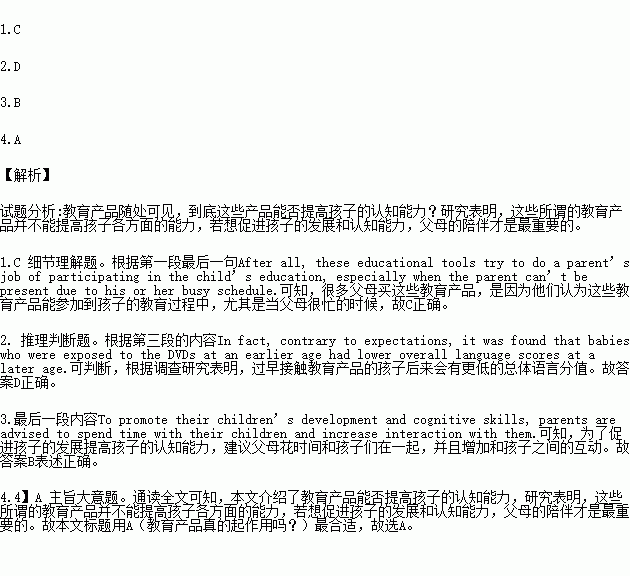题目内容
With an overwhelming variety of educational toys and learning tools in the market, you really wonder if these educational products are really beneficial to children. There have been many educational DVDs in the market that promise to stimulate a child’s learning and enhance his or her cognitive skills. Parents feel good about buying these products for their children. After all, these educational tools try to do a parent’s job of participating in the child’s education, especially when the parent can’t be present due to his or her busy schedule.
Moreover, children seem to love these DVDs that contain pictures, words, and loads of stories. Some DVDs contain fun, sing-along songs or read-aloud words to help the children learn different concepts and words. Although these are fun for the parents and the children, the question that needs to be asked is whether these DVDs are actually beneficial to the child, as they claim to be.
Although parents expected “educational” products to give their child some educational advantage, research has shown otherwise. Researchers in a recent study concluded that there was indeed no difference between the language and cognitive ability of the infants who were repeatedly exposed to educational DVDs and those who were not exposed to the DVDs. In fact, contrary to expectations, it was found that babies who were exposed to the DVDs at an earlier age had lower overall language scores at a later age. This suggested a damaging effect of such DVDs on younger children.
For several years the American Academy of Pediatrics has recommended that toddlers under age of 24 months or 2 years should not watch videos or television. However, there are many parents who believe these DVDs really help in stimulating the child and keep him or her entertained.
While it may work as a great babysitter, it is important to limit activities like video games, computer games, DVDs or TV programs. To promote their children’s development and cognitive skills, parents are advised to spend time with their children and increase interaction with them. For example, if you want to enhance language development, converse with the child, listen, and respond to whatever the child is trying to communicate. Children learn more by interacting with parents, rather than by watching DVDs.
1.Many parents love to buy educational DVDs for their children actually because ________.
A. their children have great interest in these DVDs
B. they are sure that these DVDs are beneficial to children
C. these DVDs can share their participation in children’s education
D. these DVDs are effective in improving children’ s cognitive skills
2.According to the study mentioned in Paragraph 3, educational DVDs ________.
A. need proper regulations
B. have only few advantages
C. are helpful for older children
D. are harmful to younger children
3.What is the author’s advice on promoting children’s development and cognitive skills?
A. Making a careful schedule for children’ s education.
B. Increasing interaction between parents and children.
C. Keeping the children entertained and interested.
D. Seeking support and advice from experts.
4.Which of the following might be the best title for the passage?
A. Do educational DVDs Really Work?
B. Are You Prepared for Educational Tools?
C. Are You Leading Your Child to the Right path?
D. What Should You Do for Your Child’s Education?
 名校课堂系列答案
名校课堂系列答案
